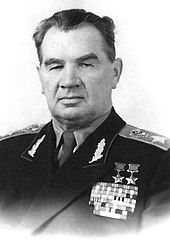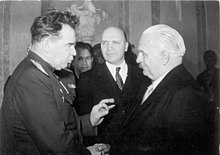Vasily Chuikov
![]()
Chuikov is a redirect to this article. For other meanings, see Chuikov (disambiguation).
Vassily Ivanovich Chuikov (Russian Василий Иванович Чуйков, viz. Transliteration Vasilij Ivanovič Čujkov, ![]() , * 31 Januaryjul. / 12 February 1900greg. in Serebryanye Prudy, Tula Governorate, Russian Empire; † 18 March 1982 in Moscow) was a Soviet military leader and politician. He received the Hero of the Soviet Union award in 1944 and 1945, and was made a Marshal of the Soviet Union in 1955.
, * 31 Januaryjul. / 12 February 1900greg. in Serebryanye Prudy, Tula Governorate, Russian Empire; † 18 March 1982 in Moscow) was a Soviet military leader and politician. He received the Hero of the Soviet Union award in 1944 and 1945, and was made a Marshal of the Soviet Union in 1955.

Vassily Ivanovich Chuikov

Vasily Chuikov (around 1960)
Live
Chuikov grew up in a poor peasant family with twelve children. He was born the eighth child and fifth of eight brothers. He attended primary school in the village for four years. At the age of 12 he went to Saint Petersburg, where his brothers were already living as simple laborers. For five rubles and board he first worked as a porter's boy for two years. Later he was trained as a locksmith and worked in that trade as well. Like three of his brothers, he was in the Baltic Fleet in Kronstadt in 1917. Two of the brothers took an active part in the storming of the Winter Palace, hence in the October Revolution. He was in the fleet only briefly before deserting with his brothers. Like his brothers, he was an early supporter of the Bolsheviks and in 1917 joined the Red Guard. He joined the Red Army in 1918. He took part in fighting the uprising of the Left Social Revolutionaries in Moscow in 1918. This was followed by four months of training at the Alexeyevsky Military School.
In 1919 he was accepted as a member of the CPSU. During the Russian Civil War he became a regimental commander and was deployed in Siberia. In 1925 he graduated from the Frunse Military Academy in Moscow. In 1929 he was in China for the first time as an adviser. From September 1929 to 1933, chief of a staff division of the Special Red Banner Fernost Army. Until 1935 head of a KUKS (advanced training course of the Red Army Troop Command). In 1935 he was at the Stalin Military Academy in Moscow for seven months. From 1936 to 1938 commander of a mechanized brigade in Bobruisk. From 1938 commander of a rifle corps. Subsequently chief of the Brobruisk Army Group, later renamed the 4th Army.
During the Soviet invasion of Poland in 1939, Chuikov was commander-in-chief of the 4th Soviet Army. During the Soviet-Finnish Winter War of 1939/1940, he commanded the 9th Soviet Army and suffered defeat at the Battle of Suomussalmi. He was then assigned as military attaché in the Republic of China from December 1940 to March 1942. In June 1942 he was promoted to lieutenant general, and from 10 July to 4 August he was in command of the 64th Army in the eastern Don Arc. On 12 September 1942 he became commander-in-chief of the 62nd Army (later the 8th Guards Army), which he commanded in the Battle of Stalingrad.
Chuikov was known for his harshness. In accordance with Stalin's order 277, he had officers shot at the end of 1942 as a deterrent who had defied his orders. In his book Stalingrad - Beginning of the Road, his view of the Battle of Stalingrad, Chuikov justified his harshness in retrospect with the phrase "time is blood" (in reference to the motto "time is money"): he had had to urge his officers to make quick decisions, since otherwise they would have endangered the lives of their subordinates by their hesitation. He shot several officers himself. Chuikov wrote: "We immediately applied the harshest measures to all cowards. On the 14th I shot the commander and the commissar of a regiment, and a little later I shot two brigade commanders and the commissars too. Everyone was completely stunned. We brought this to the attention of all the fighters, but especially the officers". In October 1942, Chuikov issued orders to the commander of the 138th Rifle Division to capture the Stalingrad railway station, adding, "I warn you that if you do not fulfill my military order, you will be put on trial." Historian Jörg Baberowski estimated that thousands of soldiers were senselessly sacrificed as a consequence of this order.
In 1945/1946, Tschuikow was head of the Soviet Military Administration in Thuringia (SMAT), from 1946 to March 1949 deputy head of the Soviet Military Administration in Germany (SMAD) and from March 1949 to November 1949 its commander. It was Chuikov who officially transferred the affairs of state to the government of the GDR in Berlin-Karlshorst by order of the Soviet government. From 1949 to 1953, Army General Chuikov was Chief of the Soviet Control Commission (SKK) and Supreme Commander of the Group of Soviet Armed Forces in Germany.
Chuikov was a candidate for the Central Committee of the CPSU from 1952 to 1961 and became a full member in 1961. After the death of Stalin, Chuikov became (1953 to 1960) head of the Kiev Military District, which initially meant a demotion for him. In 1955, however, he was promoted to Marshal of the Soviet Union. From 1960 to 1964, he was Commander-in-Chief of the USSR Land Forces and Deputy Minister of Defense of the Soviet Union. From 1964 to 1972, he was Chief of Civil Defense, and from 1972, Inspector General of the Ministry of Defense.
Chuikov described his experiences as a commander in World War II in several books. He is the only marshal of the Soviet Union to be buried in Volgograd on Mamayev Hill, the first to be buried outside Moscow, to honour his achievements during the Battle of Stalingrad.

General Chuikov congratulates Wilhelm Pieck (1951)
_Berliner_Kapitulation.JPG)
Memorial plaque at the house Schulenburgring 2 in Berlin-Tempelhof
Writings in German translation
- Stalingrad - Beginning of the Way. Deutscher Militärverlag, Berlin 1961.
- The End of the Third Reich. Goldmann, Munich 1966 (and other editions).
- Guardsmen on their way to Berlin. Military Publishing House of the German Democratic Republic, Berlin 1976.
- Stalingrad: Lessons of History. Verlag Progress Moskau 1979; parallel edition: Röderberg-Verlag, Frankfurt am Main 1979, ISBN 3-87682-593-8.
- The Battle of the Century. Militärverlag der Deutschen Demokratischen Republik, Berlin 1980 (and other editions).
Search within the encyclopedia